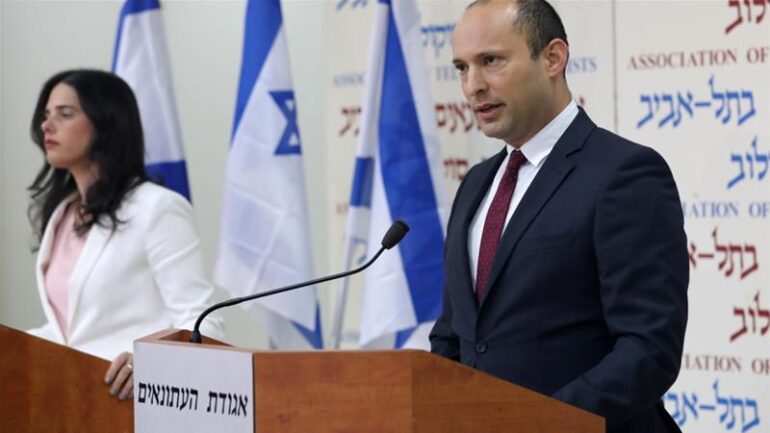Education Minister Naftali Bennett and Justice Minister Ayelet Shaked shocked the nation Saturday night with a dramatic announcement that they are splitting from the Bayit Yehudi in order to form the HaYamin HeḤadash (The New Right) party ahead of Israel’s upcoming elections on April 9th.
The ministers are formally breaking from the Bayit Yehudi Knesset faction, taking with them lawmaker Shuli Moalem-Refaeli to their new party, because three parliamentarians are legally required to leave a faction of eight in order to receive campaign funding from the state.
Although the announcement caught many by surprise, no one should really be shocked by the move.
Bennett’s goal since taking control of the National Religious Party and turning it into the Bayit Yehudi ahead of the 2012 elections has clearly been to propel himself to the prime minister’s office. But there is only so far a sectoral party associated with the national-religious public can take him. And although he attempted on several occasion to transform Bayit Yehudi into something more resembling Likud than its NRP forerunner, these efforts were resisted by the party membership and it was clearly only a matter of time until Bennett would jump.
The shock of Bennett’s Saturday night announcement had less to do with substance and more to do with timing. Since the expectation was always that he would compete for Likud’s top spot once Prime Minister Binyamin Netanyahu officially retired from politics, many were caught of guard by the fact that Bennett chose this election cycle to bolt Bayit Yehudi.
Starting his own new Moledet-style party with Shaked was also unexpected. And it has many Israelis concerned that Bennett will splinter the nationalist vote so thin that some parties won’t manage to pass the 3.25% electoral threshold.
Prime Minister Netanyahu himself warned at a press conference from Rio de Janiero on Monday that Bennett’s new party “endangers many parties that they won’t pass the electoral threshold.”
“I am going to check and do what I can to prevent this,” the prime minister added, despite the fact that a Likud attempt to lower the electoral threshold for entering Knesset already failed this week.
If Bennett wants to avoid costing the national camp votes, he’ll run a campaign that competes with Yesh Atid and Likud rather than Bayit Yehudi. This wouldn’t necessarily require Bennett to compromise on the positions he shares in common with his former political home. Just by playing up his own westernized identity and neo-liberal socio-economic agenda would be enough to attract voters away from Yair Lapid and Netanyahu. These are younger Israelis who might have in the past considered voting for Bennett and Shaked but felt alienated by Bayit Yehudi’s more traditional candidates.
In any case, Bennett’s departure creates an opportunity for Bayit Yehudi to return to its base and dump many of its former leader’s neo-liberal economic positions.
If the party can return to its traditional concern for Israel’s weaker sectors, combined with a commitment to Jewish identity and resisting Western pressure to partition the country into two states (championing Palestinian human rights might be too much to ask at this point), it could potentially grow for itself a new political base committed to Jewish national aspirations and values of social responsibility.
The best way for Bayit Yehudi to move in this direction would be to invite former Shas leader Eli Yishai to lead the party. In addition to having a proven record on social, cultural and nationalist issues, Yishai could also expand the party’s traditional base to include many Shas voters unhappy with Interior Minister Aryeh Deri’s leadership.
Another potential leader for Bayit Yehudi would be former MK Yoni Chetboun, who ran with Yishai in the 2015 elections after bolting the party over sharp disagreements with Bennett. Chetboun is currently a Netanya city councilman but can likely be convinced to return to national politics.
But the Bayit Yehudi leadership race is unfortunately already crowded with backbench lawmakers from within. Members of Knesset Motti Yogev and the far-right Betzalel Smotrich of the party’s National Union faction are already competing with Deputy Defense Minister Eli ben-Dahan for leadership. Aviḥai Boaron, who organized the resistance to the demolition of the Amona village in norther Judea, has also let it be known that he might join the race.
While none of these candidates would increase the party’s electoral potential in the way Yishai or Chetboun might, it’s clear that a question mark hangs over the entire political map in these elections until Bayit Yehudi choses its next leader and political direction.





